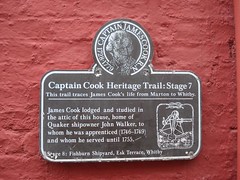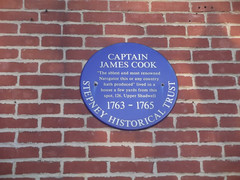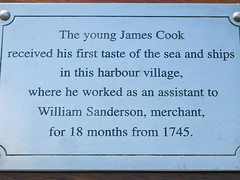Captain James Cook FRS RN


Captain James Cook FRS RN
(1728-1779)
Commemorated on 10 plaques
On this site stood a house occupied for some years by Captain James Cook RN FRS 1728-1779 circumnavigator and explorer
88 Mile End Road, Tower Hamlets, London, United Kingdom where they lived
James Cook lodged and studied in the attic of this house, home of Quaker shipowner John Walker, to whom he was apprenticed (1746-1749) and whom he served until 1755.
Grape Lane, Whitby, United Kingdom where they lodged (1745-1748) and studied (1745-1748)
Captain James Cook "The ablest and most renowned Navigator this or any country hath produced" lived in a house a few yards from this spot, 126, Upper Shadwell 1763-1765
The Highway, Stepney, London, United Kingdom where they lived in a house a few yards from this spot, at 126 Upper Shadwell (1762-1764)
Captain James Cook RN FRS 1728-1779. James Cook, circumnavigator and explorer, attended this school which was founded by Michael Postgate in 1704. Whilst in Great Ayton James Cook lived at Aireyholme Farm on the slopes of Roseberry Topping where his father worked for Thomas Skottowe Lord of the Manor. Cook left Great Ayton in 1745 for Staithes, subsequently becoming apprenticed to John Walker, ship owner of Whitby. This plaque showing the young Cook leaving Great Ayton was executed by Nicholas Dimbleby and erected by the Captain Cook Schoolroom Trust in 1997
Captain Cook Schoolroom, 99 High Street, Great Ayton, United Kingdom where they attended school
The young James Cook received his first taste of the sea and ships in this harbour village, where he worked as an assistant to William Sanderson, merchant, for 18 months from 1745.
Church Street, Staithes, United Kingdom where they was
This plaque was presented by the people of Australia to the Whitby Urban District Council to commemorate the bi-centenary of the discovery of the east coast of Australia by Lieutenant James Cook R.N. From this discovery emerged a nation 20th April - 22nd August 1770 Unveiled by His Excellency the High Commissioner for Australia. The Hon. Sir Alexander Downer K.B.E. 20th April 1970
Captain Cook Memorial Monument, East Terrace, Whitby, United Kingdom where they was
This plaque is to commemorate the men who built the Whitby ships 'Endeavour', 'Resolution', 'Adventure', 'Discovery'. used by Capt. James Cook R.N., F.R.S and also the men who sailed with him on the greatest voyages of exploration of all time 1768 - 1771 1772 - 1775 - 1776 - 1780 Unveiled in the presence of the High Commissioners of Australia and New Zealand on 26th August 1968 the bicentenary of his first voyage. "To strive, to seek, to find and not to yield"
Captain Cook Memorial Monument, East Terrace, Whitby, United Kingdom where they was
This plaque was presented by the people of New Zealand in tribute to the great navigator Captain James Cook, R.N., F.R.S. and the men who sailed with him on his voyages of discovery "In every situation he stood unrivalled and alone: on him all eyes were turned." Unveiled by the High Commissioner for New Zealand the Honourable W.L. Young 2nd April 1984
Captain Cook Memorial Monument, East Terrace, Whitby, United Kingdom where they was
This plaque was presented by the people of Canada to commemorate the 250th anniversary of the birth of Captain James Cook, R.N., F.R.S. and was unveiled by the High Commissioner for Canada the Honourable Paul Martin P.C.,C.,C.,Q.C. October 1978 Cette plaque, don du people Canadien en commemoration du 250eme anniversaire de la naissance du Captaine James Cook, R.N., F.R.S. fut inauguree par le Haut-Commissaire du Canada, l'honourable Paul Martin C.P.,C.C.,C.R. Octobre 1978
Captain Cook Memorial Monument, East Terrace, Whitby, United Kingdom where they was










